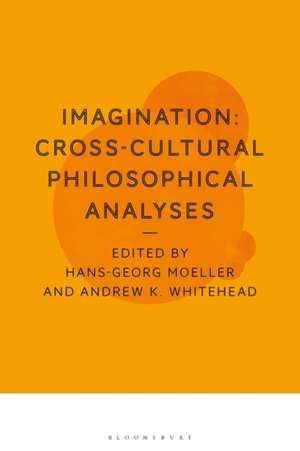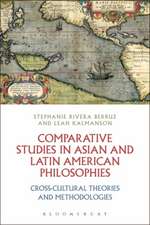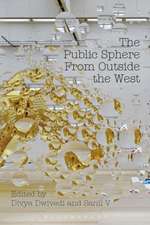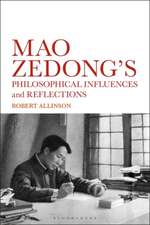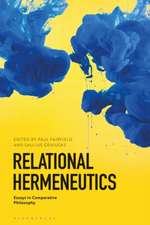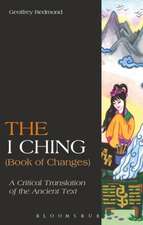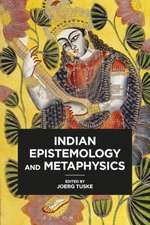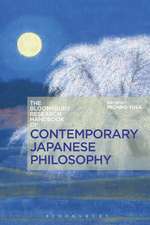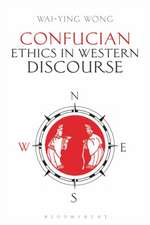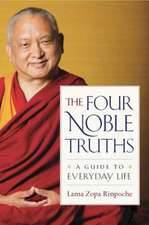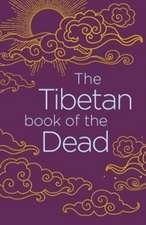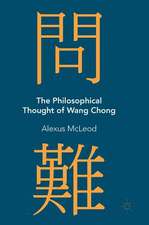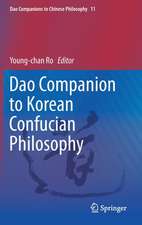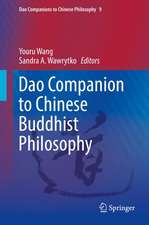Imagination: Cross-Cultural Philosophical Analyses
Editat de Professor Hans-Georg Moeller, Dr. Andrew K. Whiteheaden Limba Engleză Paperback – 10 iun 2020
| Toate formatele și edițiile | Preț | Express |
|---|---|---|
| Paperback (1) | 223.93 lei 6-8 săpt. | |
| Bloomsbury Publishing – 10 iun 2020 | 223.93 lei 6-8 săpt. | |
| Hardback (1) | 715.00 lei 6-8 săpt. | +139.94 lei 6-12 zile |
| Bloomsbury Publishing – 28 noi 2018 | 715.00 lei 6-8 săpt. | +139.94 lei 6-12 zile |
Preț: 223.93 lei
Preț vechi: 288.47 lei
-22% Nou
Puncte Express: 336
Preț estimativ în valută:
42.85€ • 45.82$ • 35.73£
42.85€ • 45.82$ • 35.73£
Carte tipărită la comandă
Livrare economică 18 aprilie-02 mai
Preluare comenzi: 021 569.72.76
Specificații
ISBN-13: 9781350163959
ISBN-10: 1350163953
Pagini: 232
Dimensiuni: 156 x 234 x 20 mm
Greutate: 0.33 kg
Editura: Bloomsbury Publishing
Colecția Bloomsbury Academic
Locul publicării:London, United Kingdom
ISBN-10: 1350163953
Pagini: 232
Dimensiuni: 156 x 234 x 20 mm
Greutate: 0.33 kg
Editura: Bloomsbury Publishing
Colecția Bloomsbury Academic
Locul publicării:London, United Kingdom
Caracteristici
Discusses East Asian perspectives alongside Western thinkers including Zhuangzi, Plato, Heidegger, Nietzsche and Confucius
Notă biografică
Hans-Georg Moeller is Professor of Philosophy and Subject Convenor for the Philosophy and Religious Studies Programme at the University of Macau, China.Andrew K. Whitehead is Associate Professor of Philosophy in the Department of History and Philosophy at Kennesaw State University, USA.
Cuprins
Introduction, Andrew K. Whitehead (Kennesaw State University, USA)PART I: Imagination in Chinese and Japanese Philosophies1. Truth and Imagination in China: Opposition and Conciliation in the Tradition, Richard John Lynn, University of Toronto, Canada2. Zhuangzi and the Literary Genre of Fantasy, Nicolas LeJeune, University of Macau, China3. Visual Zen: The Role of Imagination in Shaping a Zen Aesthetics, Rudi Capra, National University of Ireland, Cork, IrelandPART II: Comparative Studies on Imagination 4. The Imaginary and the Real in Zhuangzi and Plato, May Sim, College of the Holy Cross, Worcester, USA5. Is There Imagination in Daoism?: Kant, Heidegger, and Classical Daoism: Rethinking Imagination and Thinking in Images, Steven Burik, Singapore Management University, Singapore6. Daoism, Utopian Imagination and Its Discontents, Ellen Y. Zhang, Hong Kong Baptist University, ChinaPART III: Post-Comparative Conceptions of Imagination in World Philosophy7. Imagination Beyond the Western Mind, Julia Jansen, KU Leuven, Belgium8. Time, Habit, and Imagination in Childhood Play, Talia Welsh, University of Tennessee at Chattanooga, USA9. Images of Me in the Roles I Live: An Existentialist Contribution to Confucian Role Ethics, Andrew K. Whitehead, Kennesaw State University, USA10. Imagination, Formation, and Place: An Ontology, John W. M. Krummel, Hobart and William Smith Colleges, USA11. Between Truth and Utopia: Philosophy in North America and the Narrowing of the Social-Political Imagination, Gabriel Soldatenko, Kennesaw State University, USA
Recenzii
Each essay in this volume invites the reader to approach "imagination" from a distinct cultural and philosophical angle, thus establishing the depth and breadth-even ambiguity-of a function that is squarely at the center of what it means to be human. Rather than generate closure, this volume opens new avenues for thinking cross-culturally about how the human imagination operates and how its future possibilities might themselves be imagined.
This fascinating, pluralistic collection of essays reveals the multi-faceted phenomenon behind the singular name of "the imagination" and challenges our pre-conceptions of how it works and what it means. The authors show how imagination functions in various cultures to stretch linguistic concepts and reach beyond images and beyond the space of a single person's mind. We learn to understand imagining as the body's way of mindfulness and a power that let us live a life in common.
The distinguished scholars assembled by Hans-Georg Moeller and Andrew Whitehead in their new Bloomsbury anthology entitled Imagination do, with real imagination, what the subtitle announces by providing Cross-Cultural Philosophical Analyses of one of the most protean concepts in the philosophical pantry. What is new and intellectually exhilarating about this volume is that many of these authors, animated by the advocacy of a post-comparative methodology, offer their own often disruptive critiques of some of the most persistent and uncritical assumptions that attend the idea of imagination within the prevailing philosophical discourse.
In this pluralistic, intercultural and problematized volume authors blend a call to an imaginary neutral territory and a horizon upon returning to the genuine practice of philosophy for interlocutors that go beyond contrastive, fusing, synthesizing or deconstructive forms of comparative philosophy, and that will leave you with a zeal for a sustained reflection on potential and actual contributions to a wide range of contemporary philosophical problems.
The imagination has been a generally underrated topic in Western philosophy, while in the East-Asian tradition-although philosophical thinking takes place largely in images and narratives-imagination hardly ever appears as a philosophical topic. This collection of (post-)comparative essays highlights the role of imagination in areas such as phenomenology and artistic creation, empathy and compassion, utopias and social imaginaries. Essays on East-Asian topics show how imagination functions philosophically even in the absence of theoretical reflection on the 'faculty' itself. The volume is highly recommended for the diversity of perspectives it brings to bear on its unjustly underrated topic.
This fascinating, pluralistic collection of essays reveals the multi-faceted phenomenon behind the singular name of "the imagination" and challenges our pre-conceptions of how it works and what it means. The authors show how imagination functions in various cultures to stretch linguistic concepts and reach beyond images and beyond the space of a single person's mind. We learn to understand imagining as the body's way of mindfulness and a power that let us live a life in common.
The distinguished scholars assembled by Hans-Georg Moeller and Andrew Whitehead in their new Bloomsbury anthology entitled Imagination do, with real imagination, what the subtitle announces by providing Cross-Cultural Philosophical Analyses of one of the most protean concepts in the philosophical pantry. What is new and intellectually exhilarating about this volume is that many of these authors, animated by the advocacy of a post-comparative methodology, offer their own often disruptive critiques of some of the most persistent and uncritical assumptions that attend the idea of imagination within the prevailing philosophical discourse.
In this pluralistic, intercultural and problematized volume authors blend a call to an imaginary neutral territory and a horizon upon returning to the genuine practice of philosophy for interlocutors that go beyond contrastive, fusing, synthesizing or deconstructive forms of comparative philosophy, and that will leave you with a zeal for a sustained reflection on potential and actual contributions to a wide range of contemporary philosophical problems.
The imagination has been a generally underrated topic in Western philosophy, while in the East-Asian tradition-although philosophical thinking takes place largely in images and narratives-imagination hardly ever appears as a philosophical topic. This collection of (post-)comparative essays highlights the role of imagination in areas such as phenomenology and artistic creation, empathy and compassion, utopias and social imaginaries. Essays on East-Asian topics show how imagination functions philosophically even in the absence of theoretical reflection on the 'faculty' itself. The volume is highly recommended for the diversity of perspectives it brings to bear on its unjustly underrated topic.
